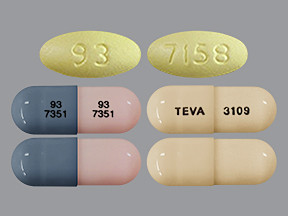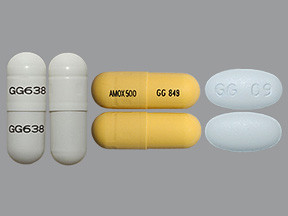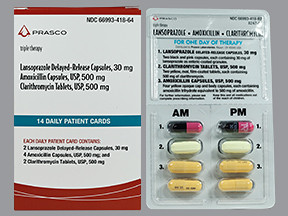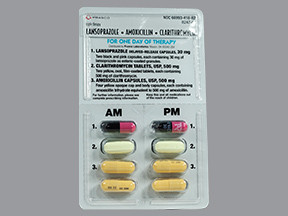LANSOPRAZOLE/AMOXICILLIN/CLARITHROMYCIN - ORAL
PHONETIC PRONUNCIATION: (lan-SOE-pra-zole/a-MOX-i-SIL-in/kla-RITH-roe-MYE-sin)
COMMON BRAND NAME(S): Prevpac
GENERIC NAME(S): lansoprazole/amoxicillin trihydrate/clarithromycin
Uses
USES: This product is used to treat stomach/intestinal ulcers caused by the bacteria H. pylori and to prevent the ulcers from returning. Treating an ulcer reduces the risk of serious damage to the lining of the stomach/intestines (such as bleeding, tearing, blockage). Lansoprazole is known as a proton pump inhibitor (PPI). It works by blocking acid production in the stomach. Decreasing excess stomach acid can help the ulcer heal. Amoxicillin and clarithromycin are antibiotics used to treat a wide variety of bacterial infections (including H. pylori). Treating the infection helps reduce the risk of the ulcer returning. Amoxicillin is a penicillin-type antibiotic and clarithromycin is a macrolide-type antibiotic. They work by stopping the growth of bacteria. The antibiotics in this product treat only bacterial infections. Antibiotics do not work for viral infections (such as common cold, flu). Using any antibiotic when it is not needed can cause it to not work for future infections.
How to use LANSOPRAZOLE/AMOXICILLIN/CLARITHROMYCIN - ORAL
HOW TO USE: Take this medication by mouth exactly as directed by your doctor, usually 1 dose (4 pills) twice daily before a meal. Swallow the lansoprazole capsules whole. Do not crush or chew. Each packet contains both the morning and evening doses of this medication (a 1-day supply). Consult your doctor or pharmacist for instructions on the proper use of this product. The dosage and length of treatment is based on your medical condition and response to treatment. For the best effect, take this product at evenly spaced times. To help you remember, take this product at the same times every day. Continue to take this product until the full prescribed amount is finished, even if symptoms disappear after a few days. Stopping antibiotics too early may allow bacteria to continue to grow, which may result in a return of the infection. Tell your doctor if your condition persists or worsens.
Side Effects
Precautions
Interactions
Overdose
Images

- color
- multi-color (4)
- shape
- other
- imprint
- 93 7351 or 93 or TEVA, 93 7351 or 7158 or 3109

- color
- multi-color (2)
- shape
- other
- imprint
- GG638 or AMOX 500 or GG C9, GG638 or GG 849

- color
- multi-color (2)
- shape
- other
- imprint
- GG638 or AMOX 500 or GG C9, GG638 or GG 849

- color
- multi-color (4)
- shape
- other
- imprint
- NATCO or A45 or D, 30 or 63

- color
- multi-color (4)
- shape
- other
- imprint
- NATCO or A45 or D, 30 or 63

- color
- multi-color (3)
- shape
- other
- imprint
- TAP or logo or AMOX 500, PREVACID 30 or KL or GG 849

- color
- multi-color (3)
- shape
- other
- imprint
- TAP or logo or AMOX 500, PREVACID 30 or KL or GG 849
Reviews
Disclaimer
IMPORTANT: HOW TO USE THIS INFORMATION: This is a summary and does NOT have all possible information about this product. This information does not assure that this product is safe, effective, or appropriate for you. This information is not individual medical advice and does not substitute for the advice of your health care professional. Always ask your health care professional for complete information about this product and your specific health needs.
No Reviews Yet